|
|
|
Sort Order |
|
|
|
Items / Page
|
|
|
|
|
|
|
| Srl | Item |
| 1 |
ID:
159189
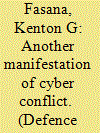

|
|
|
|
|
| Summary/Abstract |
Cyberspace is an avenue of approach through which a military force can attain objectives of value. Through these cyber avenues of approach, military forces can engage, vet, organize, and direct human agents to accomplish specific activities. Although the objectives of these activities could differ from traditional military objectives, they still have military relevance. This particular manifestation of cyber conflict is neither a new domain of war nor something outside of warfare. Rather, it can be viewed as an emerging avenue of approach in the larger context of military operations, auguring benefits in the integration of cyber activities with operations.
|
|
|
|
|
|
|
|
|
|
|
|
|
|
|
|
| 2 |
ID:
156949
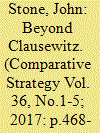

|
|
|
|
|
| Summary/Abstract |
Clausewitz has much to tell us about strategy. However, his most fundamental and enduring insights are obscured by his problematic theorizing about war in general. Essentially the same insights have been more clearly and economically articulated in the fields of political philosophy and game theory. As such, these literatures provide a more accessible introduction to the basics of strategy. The real value of Clausewitz resides in his profound understanding of how basic strategic dynamics play out in the specific context of war.
|
|
|
|
|
|
|
|
|
|
|
|
|
|
|
|
| 3 |
ID:
139114
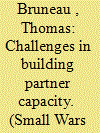

|
|
|
|
|
| Summary/Abstract |
The main emphasis in US security assistance is ‘building partner capacity’. To understand prospects for building capacity implies knowledge of the security sector, including the armed forces and also national police and intelligence agencies. The scholarly sub-discipline that should be useful for analysis of a nation's use of armed forces is civil–military relations as it ostensibly directs attention to when and how civilians choose to utilize their nation's armed forces. The goal in this article is to further refine the field of civil–military relations by focusing attention on two main concepts – democratic civilian control and strategy – and discussing their relevance in the context of building partner capacity.
|
|
|
|
|
|
|
|
|
|
|
|
|
|
|
|
| 4 |
ID:
038653
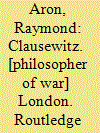

|
|
|
|
|
| Publication |
London, Routledge and Kegal Paul, 1976.
|
| Description |
xi, 418p.Hbk
|
| Standard Number |
0710090099
|
|
|
|
|
|
|
|
|
|
|
|
Copies: C:1/I:0,R:0,Q:0
Circulation
| Accession# | Call# | Current Location | Status | Policy | Location |
| 022735 | 921.35502/ARO 022735 | Main | On Shelf | General | |
|
|
|
|
| 5 |
ID:
103786
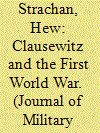

|
|
|
| 6 |
ID:
173420
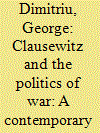

|
|
|
|
|
| Summary/Abstract |
This paper re-examines the theoretical underpinnings of Strategic Studies, proposing a novel theory and a new framework for analysing war’s fundamental relationship with politics in line with the Clausewitzian tradition. Throughout modern history, Clausewitz’s concept of politics has been misconstrued as referring only to policy whereas in fact, for him, ‘politics’ was a much broader concept, including domestic power struggles. The political logic of war is defined here as the convergence of the interrelating factors of power struggles and policy objectives within a given polity that restrains and enables these political forces. The analysis of the Clausewitzian political logic of war is conducted through the sociological ‘liquid modern’ lens. It is argued that with power increasingly shifting from centralised state-oriented political leadership towards market forces, non-state actors and other political bodies, the effectiveness of war has been reduced. This is evident in the fragmentation of Western political systems and, as a result, suboptimal strategy and the domination of domestic power struggles in political decision-making concerning war.
|
|
|
|
|
|
|
|
|
|
|
|
|
|
|
|
| 7 |
ID:
114614
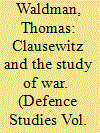

|
|
|
|
|
| Publication |
2012.
|
| Summary/Abstract |
Carl von Clausewitz produced what is widely recognised as the greatest book on war. Less commonly appreciated is the nature of the approach he adopted which enabled him to arrive at his central theoretical conclusions. In the course of his studies Clausewitz confronted a number of central methodological dualisms. He believed the tensions inherent in these pairs could not be ignored and ultimately sought to reconcile their apparent contradictions through a dialectical process of intense reflection and study. Knowledge of such issues offers students of war and strategy a valuable methodology in coming to grips with such a vast and complex subject.
|
|
|
|
|
|
|
|
|
|
|
|
|
|
|
|
| 8 |
ID:
072294
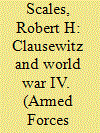

|
|
|
| 9 |
ID:
193167
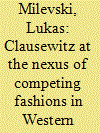

|
|
|
|
|
| Summary/Abstract |
The history of strategic thought is well trodden ground, but has not been approached from a fashion perspective. This article focuses on the issue of engagement among intellectual fashions by examining how events may lead observers to believe that established, long cycle ways of thinking have become partially, if not wholly, inapt, thereby leading to an uncertain and perhaps incomprehensible strategic environment. Newer, revisionist but often short-lived concepts emerge as a consequence, variously complementary to, despite, or in direct repudiation of longer-lived concepts or theories. This dynamic is examined through the interaction between Clausewitzian and competing fashions.
|
|
|
|
|
|
|
|
|
|
|
|
|
|
|
|
| 10 |
ID:
081290
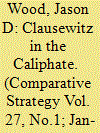

|
|
|
|
|
| Publication |
2008.
|
| Summary/Abstract |
Out of necessity, military doctrine evolves in response to changes in the strategic and tactical environment. In the time since Clausewitz first articulated the center of gravity (COG) concept, his theory has taken many forms that reflect the ever-changing nature of warfare. In the post-9/11 security environment, COG doctrine must be further revised in order to be of use against the elusive, asymmetric enemies that now threaten the United States and its allies. These revisions must focus on redefining the concept and its applicability, as well as on how to identify enemy COGs.
|
|
|
|
|
|
|
|
|
|
|
|
|
|
|
|
| 11 |
ID:
154883
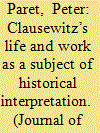

|
|
|
|
|
| Summary/Abstract |
A new biography leads to reflections on different approaches to biography, and on the relationship of military history to the histories of ideas and of culture.
|
|
|
|
|
|
|
|
|
|
|
|
|
|
|
|
| 12 |
ID:
156674
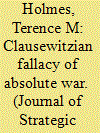

|
|
|
|
|
| Summary/Abstract |
Clausewitz was much preoccupied with the apparent contradiction between real and absolute war. Why did war in history so rarely exhibit the extremes of violence and energy implied in the pure concept of war? Clausewitz’s commentators have usually followed him in thinking that this was a genuine problem in need of a solution, but I want to question that view. I will argue that Clausewitz did not have a coherent philosophy of absolute war, and therefore the contradiction he posited between real and absolute war was equally meaningless – as, too, was his effort to resolve it by claiming that some real wars approached or even attained the absolute form of war. The real problem was not the opposition of real and absolute war, but the self-contradictory theory of absolute war.
|
|
|
|
|
|
|
|
|
|
|
|
|
|
|
|
| 13 |
ID:
181743
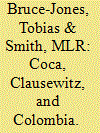

|
|
|
|
|
| Summary/Abstract |
Studies of micro-level violence make various claims to universality: namely, that there are patterns of violence in civil wars that are observable across time and space. The analysis of rebel violence against civilians constitutes one of the enduring themes of these studies. By evaluating the actions of the Revolutionary Armed Forces of Colombia (FARC) during the latter half of the Colombian civil war, this paper demonstrates that the claims of micro-level studies are unable to account for FARC’s violence against civilians. In response, this study provides an alternative framework for understanding FARC’s violence. Informed by the theories of Carl von Clausewitz it is possible to comprehend the logic of FARC’s violence against civilians within a strategic framework that aimed to advance the movement’s political goals. However, it also illustrates that FARC was influenced heavily by its involvement in the drugs trade. The main findings are a) that whilst FARC’s acts of violence may have contained similarities to that of other drugs cartels FARC did not become a narco-guerrilla organization, b) the case of FARC demonstrates that ultimately there are no reproducible patterns in war, micro-level or otherwise.
|
|
|
|
|
|
|
|
|
|
|
|
|
|
|
|
| 14 |
ID:
077334
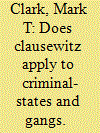

|
|
|
|
|
| Publication |
2006.
|
| Summary/Abstract |
Criminal-States and Criminal-Soldiers present unique problems for contemporary international political theory. This essay examines the applicability of the theory of war developed by Carl von Clausewitz to Criminal-States and Criminal-Soldiers. As modified by Aristotle's idea of justice as the basis for the political community, this essay proposes that Clausewitz's famous connection between politics and war holds where such states and soldiers evince political behavior. Some contrasting implications for states and state leaders are examined when such entities evince - and do not evince - political behavior
|
|
|
|
|
|
|
|
|
|
|
|
|
|
|
|
| 15 |
ID:
162833
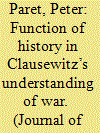

|
|
|
|
|
| Summary/Abstract |
Drawing on statements by Clausewitz long known but ignored, the article traces his early and soon dominant interest in the past as it develops out of his experiences as a child and young man to become a major element in his thinking about the present. The article points to his easy shifting back and forth between an exclusively military approach to the history of war and a more encompassing political, social, and cultural interpretation that emphasizes the psychological forces of leaders and followers, and comments as well on the relationship between his historical and his theoretical work. In noting some general issues that turn people into historians, while following the unique conditions that led to Clausewitz’s massive historical writings, the article opens new perspectives on his thought and his times that may be worth pursuing further.
|
|
|
|
|
|
|
|
|
|
|
|
|
|
|
|
| 16 |
ID:
169105
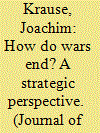

|
|
|
|
|
| Summary/Abstract |
This article gives an overview of the literature on war termination both in the fields of behaviouralism social sciences and policy-oriented strategic studies. It identifies shortcomings and problems related to both lines of research. The main problem is the undifferentiated and indiscriminate use of the term ‘war’. The article proposes a categorisation of wars that could form the basis for more thorough research on the topic of war termination.
|
|
|
|
|
|
|
|
|
|
|
|
|
|
|
|
| 17 |
ID:
107897
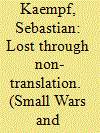

|
|
|
|
|
| Publication |
2011.
|
| Summary/Abstract |
While Carl von Clausewitz has generally been respected as one of the most profound philosophers of war, his expertise has been regarded as somewhat limited if not even irrelevant to the so-called 'new wars' of the post-Cold War world. Many scholars in international relations have claimed that 'new wars' are essentially 'post-Clausewitzian' and 'post-trinitarian' in nature, meaning that they are no longer fathomable through a Clausewitzian framework. However Clausewitz's earlier writings were nearly exclusively dedicated to guerrilla warfare, or what he called 'small wars'. These writings have been largely overlooked by many analysts of contemporary conflicts. By drawing on his rare and untranslated writings, the article uncovers a critical part of Clausewitz's expertise in asymmetric warfare and shows that, far from being irrelevant in an age where interstate warfare is increasingly being replaced by conflicts between states and semi-/non-state actors, Clausewitz's philosophical writings actually shed new light into the particular interactive dynamics generated during wars waged under conditions of asymmetry.
|
|
|
|
|
|
|
|
|
|
|
|
|
|
|
|
| 18 |
ID:
167459
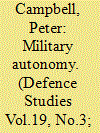

|
|
|
|
|
| Summary/Abstract |
Military officers often oppose political interference in the conduct of war. Political leaders respond by citing Clausewitz’s contention that “war is the continuation of politics with the addition of other means.” Scholarship in security studies and civil-military relations argues that civilians are right to oppose military autonomy because it serves the parochial interests of the military. However, through the dialectical relationship between the violent essence of war and its political nature, Clausewitz provides an alternative explanation for military demands for autonomy. He shows that military and political leaders are prone to an incomplete understanding of war that can undermine strategy and policy.
|
|
|
|
|
|
|
|
|
|
|
|
|
|
|
|
| 19 |
ID:
141150
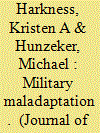

|
|
|
|
|
| Summary/Abstract |
Tactical learning is critical to battlefield success, especially in a counterinsurgency. This article tests the existing model of military adaption against a ‘most-likely’ case: the British Army’s counterinsurgency in the Southern Cameroons (1960–61). Despite meeting all preconditions thought to enable adaptation – decentralization, leadership turnover, supportive leadership, poor organizational memory, feedback loops, and a clear threat – the British still failed to adapt. Archival evidence suggests politicians subverted bottom-up adaptation, because winning came at too high a price in terms of Britain’s broader strategic imperatives. Our finding identifies an important gap in the extant adaptation literature: it ignores politics.
|
|
|
|
|
|
|
|
|
|
|
|
|
|
|
|
| 20 |
ID:
151570
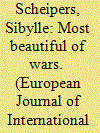

|
|
|
|
|
| Summary/Abstract |
Carl von Clausewitz was both an avid analyst of small wars and people’s war and, during the wars of liberation, a practitioner of small war. While Clausewitz scholars have increasingly recognised the centrality of small wars for Clausewitz’s thought, the sources and inspirations of his writings on small wars have remained understudied. This article contextualises Clausewitz’s thought on small wars and people’s war in the tradition of German philosophical and aesthetic discourses around 1800. It shows how Clausewitz developed core concepts such as the integration of passion and reason and the idea of war in its ‘absolute perfection’ as a regulative ideal in the framework of his works on small wars and people’s war. Contextualising Clausewitz inevitably distances him from the twenty-first-century strategic context, but, as this article shows, it can help us to ask pertinent questions about the configuration of society, the armed forces and the government in today’s Western states.
|
|
|
|
|
|
|
|
|
|
|
|
|
|
|
|
|
|
|
|
|